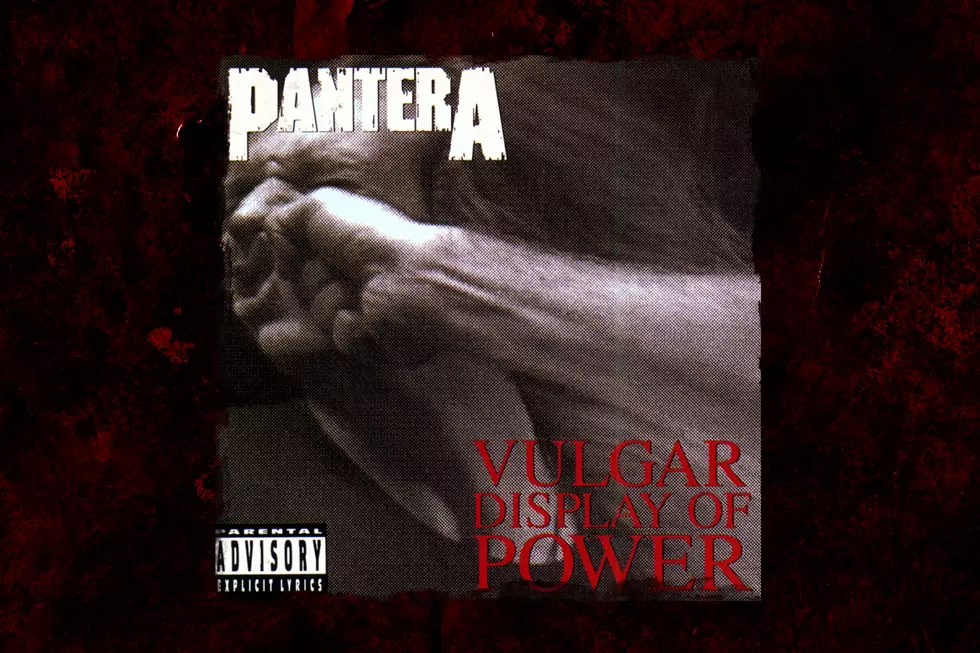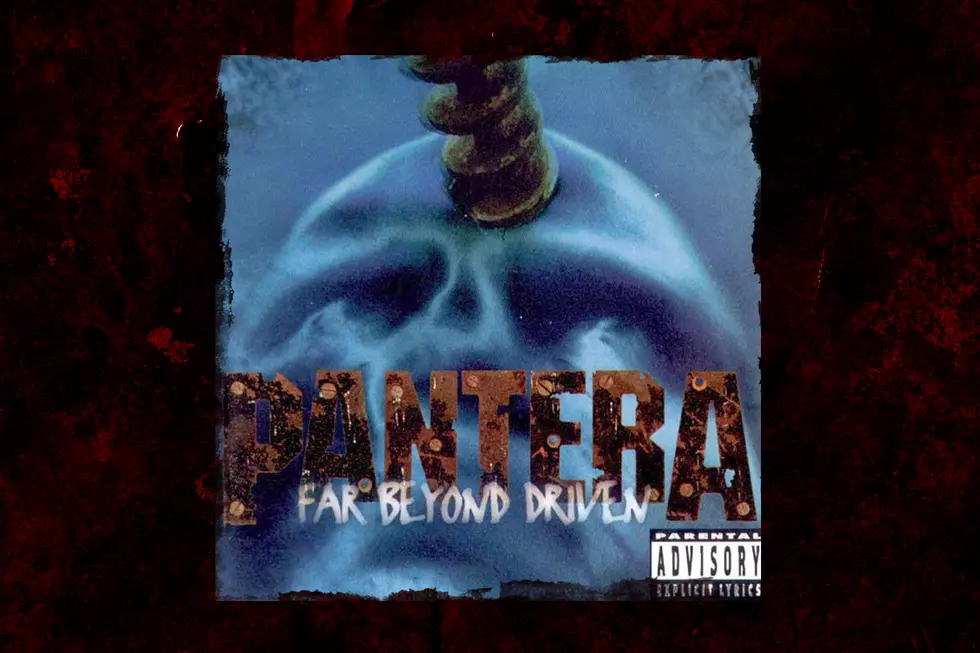
31 Years Ago: Pantera Release the Groundbreaking ‘Vulgar Display of Power’
During the cycle for their well-received major label debut, Cowboys From Hell, Pantera toured with Judas Priest, Exodus, Sepultura, Suicidal Tendencies and Prong. By the time they got back home to Texas in 1991 they were energized by the excitement of playing for appreciative crowds, getting wasted with other bands and rocking different venues every night.
After a mere two-week break to decompress, they headed right into Pantego Sound Studio, the facility owned by Dimebag Darrell and Vinnie Paul’s dad, Jerry Abbott, and started jamming. At the time, the band members were on overdrive, realizing they had the opportunity to raise the bar and take their music to – as they called it – another level. The result of their efforts was Vulgar Display of Power, an unrelenting slab of precision riffs and cathartic energy that came out on February 25, 1992.
“Vulgar Display of Power was definitely the defining moment of Pantera,” vocalist Philip Anselmo said. “The sound was the absolute stripping away of all the bullshit and letting everything come out emotionally and going for the money right off the bat. Vulgar Display of Power absolutely encapsulated Pantera.”
Drummer Vinnie Paul added, “We always knew we were more than a club band and we always knew we were talented musicians and we had the skills to kick it up a notch. We wanted to prove to everybody that we had a little bit more in the gas tank. We were so fired up our mentality was, ‘Just give us the ball and we'll get a touchdown.’”
Everyone in the band was gunning to make a heavier, more brutal album than Cowboys From Hell, which contained moments of Judas Priest worship and near-commercial showmanship. But the band had a different idea of how to reach the next plateau of heaviness.
Anselmo started listening to more hardcore and emulating the honest, confessional and confrontational quality of the bands in the scene, while bassist Rex Brown heard Metallica’s 'Black Album' and decided he wanted to be the opposite of that.
And Vinnie Paul just wanted to hammer the double bass and play the fuck out of his drums. But it was guitarist Dimebag Darrell who streamlined the band’s vision, writing most of the riffs and song structures, which ranged from the slow, simple sludge of “Walk” to the sledgehammer ferocity of “Fucking Hostile.”
Pantera, "Walk" Music Video
“Pantera were totally driven, as driven as anybody could ever be,” recalled Jerry Abbott.
“Darrell had his four-track that he slept with. And when they came into the studio, they weren’t fooling around. They’d worked together enough until the four of them were one. They were all prepared and in particular Darrell because he was the main person who put together the basics of their music. And between him and Vinnie, they wrote those tunes as far as the band structure and the music that was played. Phil had the freedom to do whatever he wanted to. It was kind of like the Van Halen thing where Eddie and Alex would go in and lay down the stuff and whatever David Lee [Roth] wanted to do, they didn’t give a crap because they had done their part and they knew he’d do his.”
Unlike Cowboys From Hell, which Pantera demoed before recording, most of the songs for Vulgar Display of Power were composed in the studio with producer Terry Date. The exceptions were “A New Level,” “Regular People (Conceit)” and “No Good (Attack the Radical,”
“We demoed those before Terry came in because we wanted to get a head start,” Vinnie Paul said. “We had started working on getting the tones and they were pretty good, but when Terry showed up we really just honed it in and got it going. I think one of the most important things for us was creating this special sound that people would know as Pantera. We got real close to it on Cowboys, but we really focused on honing the guitar sound to what it ended up being. And we really focused on the drums being really percussive with a nice attack.”
Once Date and the band were content with the tones they had dialed in, they started simultaneously writing and tracking. While Dimebag had already composed some of the riffs, he, the rest of the band and Date acted on impulse, spontaneously combining passages, establishing grooves and relying on intuition to know when something sounded right.
It was with that mindset that Pantera created some of their most popular songs, including “Mouth For War,” “A New Level,” and “This Love.” And from that point on, Pantera never demoed another song before they started recording.
“We never were a big band on doing preproduction or demos or anything,” Vinnie Paul said. “We always wanted to capture the initial vibe of the song and the only way to ever do that was to do it as we were writing it. A lot of bands would record demos back in the day for everything, but we never wanted to get caught up in the vibe of doing demos and overthinking it and doing it again. We just caught the natural aggression that was there.”
Pantera, "Mouth for War" Music Video
In addition to writing from the gut, Pantera fine-tuned everything until it was tighter than a clenched fist. If the tempo on a take wasn’t perfect or if the bass and guitars weren’t exactly in synch they’d keep working on a song until they nailed it.
“Dime would always put the guitars down first and then I would put the bass down,” Brown said. “We would sit there for hours and microscope each individual note. Now, this was before you had any ProTools or anything like that. We’d just take all the drums out on the whole thing and listen to every single tone and muted guitar part to make sure the guitars and bass were sitting right on top of one another. That’s why sometimes you don’t hear the bass; it’s just so meshed in with the guitar that it sounds like one giant tone.”
As focused as Pantera were when they worked, Dimebag Darrell got bored easily and he dug mischief almost as much as he loved playing the guitar. So inevitably, once Pantera had been working for several hours, shenanigans would ensue.
“Man, Dime always had a prank prepared or a joke to pull,” Brown said. “He was nonstop, either to fuck with the other guy or just to get a laugh. There was always something nonsensical about the guy. He’d just finish his parts and then let loose. And he was so funny and entertaining that we couldn’t get mad at him.”
“There was all kinds of stuff going on,” Date said. “I remember we had some darts in the studio and one of their buddies was in there barefoot. So we had him stand there and played darts around him. And somehow his foot became a target for the darts. He got hit at least once in the foot with a dart. It was completely hysterical, even to him.
“And I remember many of my rental cars getting trashed. Once, Vinnie took his car and drove through a field and a bunch of ditches and it came back completely covered in hay. When I did those records with the guys it was just me. There was no assistants or extra personnel. So it was a lot of work. And the majority of the work from me was trying to keep these guys from straying and having too much fun. So I as constantly going, ‘Okay c’mon, let’s get to work.’ And of course, whenever you do that they take it one step further and do whatever they can to keep the fun going.”
In addition to having fun with his bandmates, Anselmo spent many hours laboring over his lyrics. Not only did he want to escape the frivolity that existed in metal at the time, he wanted to scream like his favorite hardcore howlers and write like Henry Rollins. Not that Anselmo imitated Rollins, but his ability to write about the trauma and turmoil in his life without sounding preachy was similarly poetic.
“I wanted to sing the truth, as ugly as it was a lot of the time,” he said. “In songs like ‘Hollow’ and ‘This Love’ I wrote about losing people. And I’ve had healthy, healthy doses of it from early in my life — in New Orleans, especially. There was a punk rock band there called Shellshocked that set the bar for the local scene. And in 1987, their guitar player, Mike Hatch — one of my good friends, committed suicide — I had pretty much just moved to Texas. I couldn’t attend his funeral because Pantera was playing. I also had a former high school friend named Roman Petrozza, who had taken his life. I had a friend named Henry Glover, who had taken his life so tragically. He was such a good kid, man. They were all so young. So something like 'This Love' is not a specific song about any one of them. It’s a collective. I think even then, when I was writing it in 1992, I knew that people were going to take the lyrics and make them their own. I tried to make it a heart-throttling gut-wrencher for everyone to relate to.”
Pantera, "This Love" Music Video
Two months into the recording process, in September 1991, Pantera were invited to play a show in Russia opening for AC/DC and Metallica. The Monsters of Moscow concert was the first time most Russian artists had been exposed to heavy metal bands from outside their country. The gig couldn’t have come at a better time. Pantera needed a break from the studio and they benefited from the exposure to life outside of Western culture.
“The crowd treated us like Led Zeppelin even though most of them had never heard of us,” Vinnie Paul said. “They had only heard Metallica and AC/DC because their music was available on the black market. I remember walking around Red Square and I bought a whole Russian army outfit from some dude for $10. Rubles were worth nothing. It was just ridiculous how poor and corrupt and wrecked the whole country was at that time. They gave us a tent to stay in and a half a bottle of tequila and that’s all we got that day and that was fine with us. We were just so happy just to be there. They made a rock documentary about it called For Those About to Rock, and every time I see it, I just get goosebumps. It was a really a great performance. We were as good as anybody else that played that day.”
Pantera flew from Russia to Texas with an ever more acute sense of focus and determination. They were inspired by the reception they had received at Monsters of Moscow and stoked about the music they had already written. They couldn’t wait to bang out more tunes and as soon as they plugged in their musical chemistry was as strong as it had ever been.
“The music just bled out of us,” Anselmo said. “At the time, I was on the most positive kicks I’ve ever been on. When I wrote [lyrics] like ‘new level of confidence,’ it was fuckin’ true. I was alive, man.”
“Back then, there was never really any arguing,” Brown said. “Our way of arguing was if one guy was down, the other three picked on him to, like, try to boost his morale.”
When Pantera finished recording the album, they flew to New York to master the record at Master Disc. The band sequenced the songs and the studio placed them in order on a master tape. Then they sat down and listened to what they had created.
“Dime was sitting there on the couch and he was crying all the way through it,” recalled Vinnie Paul. “And I went, ‘Dude, are you all right?’ And he said, ‘It’s perfect. It’s perfect. It’s exactly what I always wanted and always dreamed of. It’s fuckin’ perfect.' It meant so much to him that he became emotional.”
Vulgar Display of Power debuted on the Billboard album chart at No. 44. While that’s the highest the album charted, it remained on the charts for 79 weeks. While Pantera’s next album, Far Beyond Driven, would enter at No. 1, the band was thrilled that their second major label release – one which they had worked so hard on and were so proud of – hit Billboard.
“I had sat for years in the studio reading Billboard magazine and now to actually see the album chart really blew me away,” Brown said. “Even at 44 – that was unbelievable. It’s just hard to describe how fast and quick it all happened. It really was a dream come true. There was a lot of hard work and all that paid off. All the sacrifices we had to make in our life were all worth it.”
While Far Beyond Driven charted higher, Vulgar Display of Power had legs and became Pantera’s biggest album. The record was certified Gold by the RIAA on February 9, 1993 and was a slow, but steady seller. On November 7, 1997 Vulgar Display of Power went Platinum and on July 7, 2004 it went double Platinum.
On May 15, 2012, Elektra issued a two-disc deluxe edition to celebrate the album’s 20th anniversary. The first disc was a remastered version of the original along with a previously unreleased cut called “Piss.” The second disc was a DVD that featured five songs from the Pantera’s 1992 Monsters of Rock performance in Reggio Emilia, Italy and videos for “Mouth of War,” “This Love” and “Walk.”
“It’s funny because even though everyone looks back at that album as one of our best records, if not our best, it was an album that came out of a really sincere place. We were just so hungry. We were making $150 a week per diem. We weren’t making a paycheck. We were just doing it because we loved music and we had fun jamming together. We were a team. We were brothers. And that’s worth more than anything, man.”
Loudwire contributor Jon Wiederhorn is the author of Raising Hell: Backstage Tales From the Lives of Metal Legends, co-author of Louder Than Hell: The Definitive Oral History of Metal, as well as the co-author of Scott Ian’s autobiography, I’m the Man: The Story of That Guy From Anthrax, and Al Jourgensen’s autobiography, Ministry: The Lost Gospels According to Al Jourgensen and the Agnostic Front book My Riot! Grit, Guts and Glory.
Loudwire Legacy: The Three-Part Documentary on Pantera's Vulgar Display of Power
Pantera Albums Ranked
More From Loudwire









